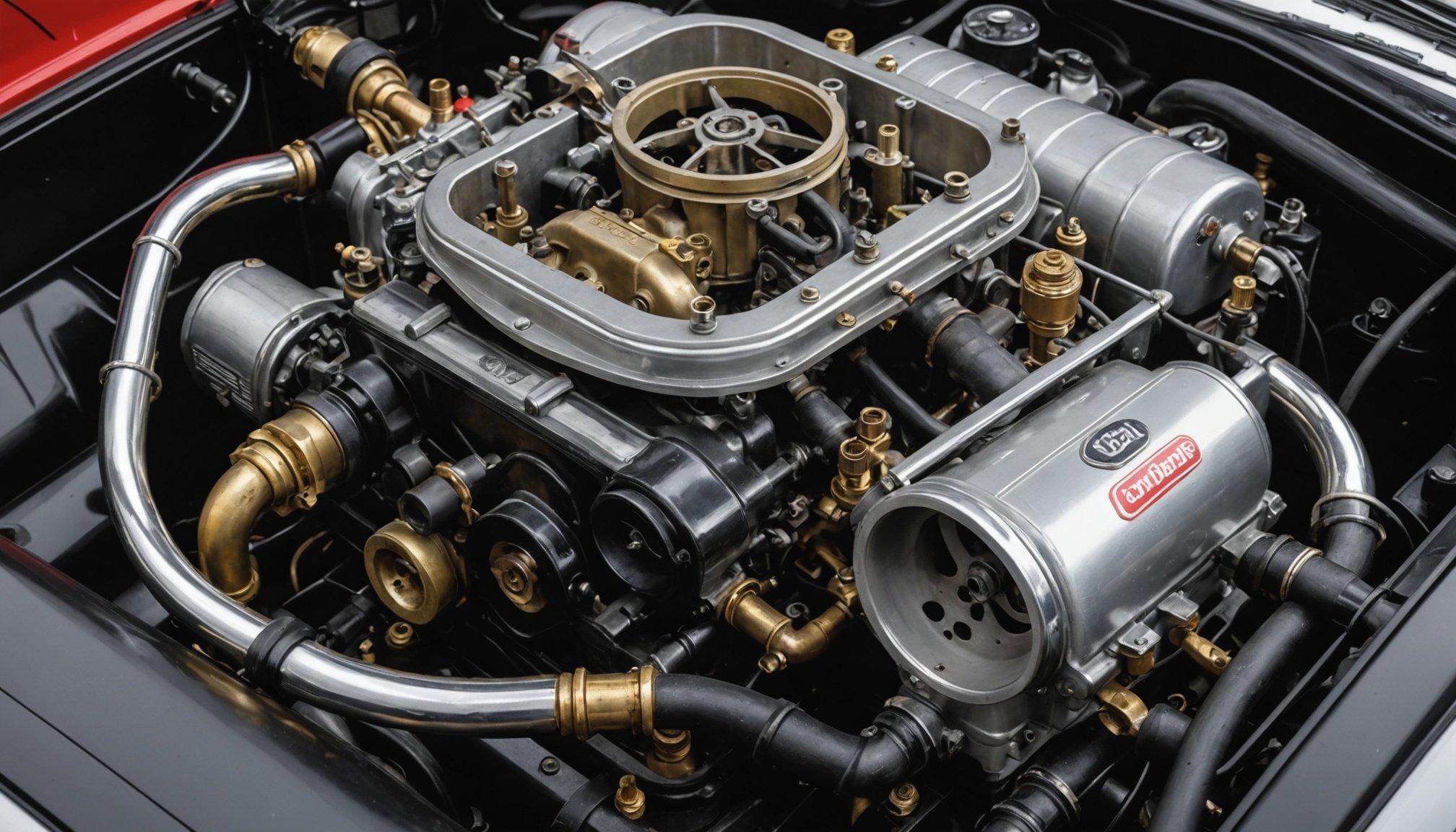Understanding Carburetors
Carburetors play a critical role in classic UK cars, acting as the key component in mixing air with fuel for internal combustion engines. Understanding the different carburetor types can greatly enhance the performance and reliability of these vintage vehicles. Generally, carburetors can be categorized into several main types: single-barrel, dual-barrel, and four-barrel carburetors. Each type serves specific performance needs, with single-barrel carburetors being the simplest and commonly used in smaller engines, while four-barrel carburetors cater to high-performance requirements and larger engines.
The process of carburetor mechanics involves regulating the air-fuel ratio by utilizing a series of valves and jets to ensure optimal combustion. Precise functioning of these components directly impacts the engine’s performance, fuel efficiency, and response to acceleration. Hence, a well-maintained carburetor ensures smoother and more efficient driving experience.
Have you seen this : Comprehensive handbook: expert tips for installing a roof-mounted bike rack on your uk vehicle
It’s essential to prioritise carburetor maintenance to retain the peak condition of classic UK cars. Regular cleaning and inspection prevent blockages and corrosion, which are common issues in older vehicles. Routine checks for leaks and cracks in the body of the carburetor can also avert potential engine performance issues, ensuring these beloved vintage cars continue to run smoothly for years to come.
Tuning and Adjustments
Carburetor tuning is essential for optimising engine performance and ensuring that classic UK cars run smoothly. Implementing effective tuning begins with understanding the role of carburetor tuning in enhancing overall vehicle performance. The process involves a series of precise adjustment techniques that cater to improving the fuel-air mixture, ultimately leading to better engine response.
Also to see : Unlocking the secrets: a comprehensive step-by-step guide to legally converting your uk petrol car to lpg!
A step-by-step guide to performing adjustments starts with identifying signs of imbalanced mixtures, such as poor fuel efficiency or erratic idling. These issues often hint at the need for meticulous fine-tuning of the carburetor settings. Key components to adjust include the idle mixture, idle speed, and float height—all of which contribute to the seamless operation of the vehicle.
Equipping yourself with the right tools is vital to making accurate adjustments. Tools such as a vacuum gauge, tachometer, and screwdriver set are indispensable for effective tuning. Each tool serves a specific purpose: the vacuum gauge helps in fine-tuning the air-fuel mixture, the tachometer measures engine speed during the tuning process, and screwdrivers facilitate adjusting carburetor screws.
By mastering carburetor tuning techniques, enthusiasts can significantly elevate the performance tuning of their beloved classic cars, empowering them with enhanced power and responsiveness.
Maintenance Best Practices
Maintaining the carburetor in classic UK cars is crucial for optimal vehicle performance. Routine maintenance not only ensures smoother operation but also prolongs the life of this essential component. Begin with regularly scheduled check-ups to identify any signs of wear or leaks early on, especially since such issues can lead to engine inefficiency.
Cleaning techniques are vital in preventing build-up and corrosion, common nuisances in older vehicles. For an effective clean, start by removing the carburetor and soaking it in a carburetor cleaner solution. Use a brush to scrub away deposits and a compressed air canister to blow out any debris from the jets and passages. This detailed approach will keep the carburetor free of blockages.
Pay attention to signs of wear, like persistent engine stalling or poor acceleration, which may indicate the need for a rebuild or replacement. Carburetor rebuild kits are available for enthusiasts keen to tackle the process themselves. They provide essential parts such as gaskets and diaphragms, crucial for a successful rebuild.
Proactive upkeep for classic cars, particularly their carburetors, ensures these prized vehicles continue to deliver their renowned driving experience. Regular maintenance is the foundation of any enduring classic car relationship.
Troubleshooting Common Issues
Experiencing issues with carburetors in classic UK cars can be quite common, especially when dealing with vintage technology. Understanding the prevalent carburetor troubleshooting approaches is essential for maintaining car performance. One of the frequent common problems involves inconsistent idling or stalling, often resulting from blockages or incorrect fuel-air ratios. In these instances, a thorough cleaning of the jets and passages can restore proper flow and functionality.
To accurately diagnose these performance issues, start by observing symptoms such as rough idling, reduced fuel efficiency, or black smoke from the exhaust. These can indicate a faulty carburetor needing attention. A vacuum gauge can effectively measure the engine’s vacuum pressure, offering insights into potential blockages or leakages.
Diagnostic techniques like visual inspection for cracks or leaks, checking fuel lines for blockages, and ensuring the choke is properly functioning are critical. Delving deeper, case studies showcase how enthusiasts tackled these hurdles. For example, owners have successfully used ultrasonic cleaners to remove stubborn deposits, resulting in enhancements in vehicle performance.
By implementing these diagnostic steps, enthusiasts can address performance issues efficiently, providing their classic vehicles with the care and precision they deserve.
Community Insights and Stories
In the classic car community, enthusiasts gather to share their fascinating restoration stories and expertise in maintaining vintage vehicles. These shared experiences foster a supportive environment that proves invaluable, especially for those new to the world of classic UK cars. Through forums and meetups, members offer insights on carburetor restoration—mistakes to avoid, tips for success, and even specific examples of tricky fixes.
One particularly engaging account involves a proud owner of a 1960s Mini Copper. They recount overcoming a stubborn carburetor issue with guidance from the community. Others attest to similar breakthroughs, often crediting the power of collaboration for their newfound knowledge and success.
The community thrives on resource sharing, with members swapping rare parts or tools essential for troubleshooting. This network extends to online platforms where carburetor enhancements are discussed extensively. Case studies on these platforms explore innovative carburetor modifications, illustrating the impact of these alterations on performance upgrades.
Real-life examples highlight successful enhancements across various classic cars, revealing impressive gains in horsepower and fuel efficiency. The collective wisdom of the classic car community remains an invaluable resource, reinforcing the joy of preserving these automotive treasures.
Performance Enhancements
Exploring performance upgrades for carburetors in classic UK cars is a thrilling journey towards improving both horsepower and fuel efficiency. These enhancements can unfurl a realm of possibilities, allowing vintage vehicles to perform exceptionally without compromising their character. Carburetor modifications primarily focus on optimizing the air-fuel mixture delivery, thus enhancing power and efficiency significantly.
Key modifications often involve:
- Upgraded jets and needles for better fuel flow.
- Performance air filters that increase airflow.
- High-performance gaskets that improve sealing and prevent leaks.
Each of these components plays a crucial role in boosting your vehicle’s engine response and power output. When selecting parts, consider compatibility with your specific carburetor type and the desired level of performance improvement.
While modifications can substantially impact horsepower, it is essential to balance performance gains with practicality. Extensive testing should be conducted to ensure adjustments do not negatively impact drivability or engine reliability.
In conclusion, enhancing power through intelligent carburetor modifications offers a rewarding venture for classic car enthusiasts eager to elevate their beloved vehicles. These upgrades not only provide noticeable performance improvements but also reignite the joy of driving a well-tuned classic.











